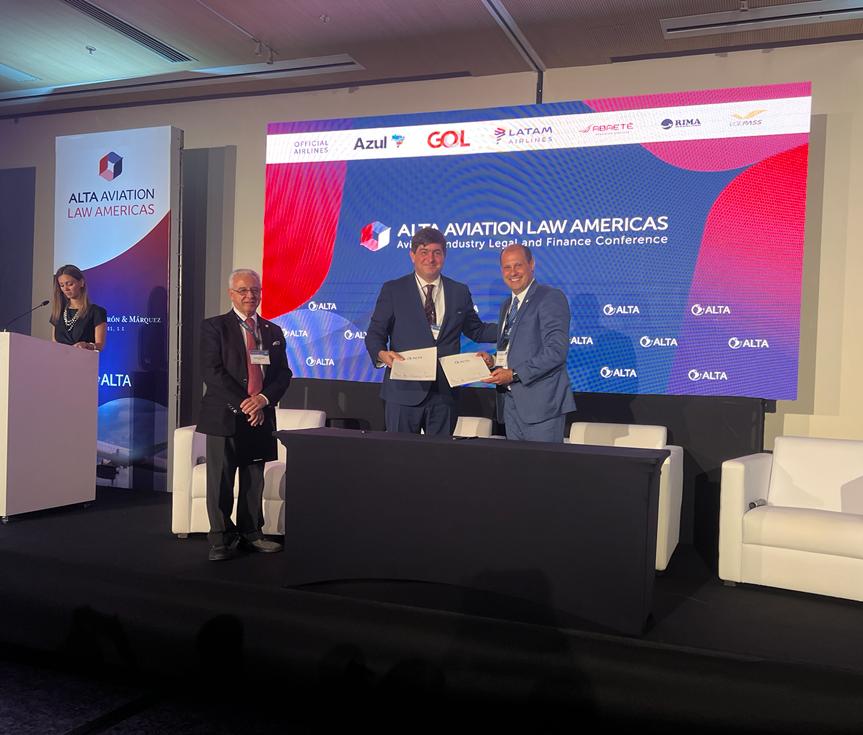Source: ALTA
- Sustainable aviation fuel, also known as SAF, is a cornerstone on the route to meeting the environmental goals set by the aviation industry to achieve zero net emissions by 2050. It is also a powerful economic engine with the prospect of generating significant socioeconomic contributions for countries in the short, medium and long term.
Sustainable aviation fuel, also known as SAF, is a cornerstone on the route to meeting the environmental goals set by the aviation industry to achieve zero net emissions by 2050. Aviation industry is also a powerful economic engine with the prospect of generating significant socioeconomic contributions for countries in the short, medium and long term.
In the Latin American and Caribbean region, the development of a SAF-producing industry requires cooperation between governments and private industry and an efficient regulatory framework with legal certainty to attract investment.
Achieving this collaboration between the public and private sectors is one of the priority topics on the agenda of ALTA Aviation Law Americas 2022, which is being held from September 14 to 16 in Rio de Janeiro, Brazil. The first panel of the conference was dedicated to SAF, with the participation of Pedro de la Fuente, senior manager of external affairs and sustainability of IATA, as moderator, Erasmo Batistella, CEO of energy company BSBios, and Johanna Cabrera, Deputy Sustainability Manager of LATAM Airlines.
The experts discussed the advances of the private sector in the deployment of SAFs, the economic growth figures derived from this industry, the public policies necessary to attract investments, the existing and projected demand from airlines, and the prospects for the coming years.
“The transition from hydrocarbon-based fuels to SAF requires creating a production and distribution chain from the ground up. Previously, it is necessary to align industry-government work, which is critical to achieve efficient policies, since it is necessary to have legal certainty that allows investments and the development of infrastructures that generate competitiveness. The region has all the required raw materials and the capacity to create the necessary jobs to achieve it. To name an example, since we are in Rio de Janeiro, Brazil has the potential with its raw materials to supply over 30% of the global demand for SAF by 2030. This is a great opportunity that we cannot miss,” said José Ricardo Botelho, ALTA’s Executive Director & CEO.
Erasmo Battistella, CEO of BSBIOS, shared the details of what will be the first SAF plant in Latin America and the Caribbean in Paraguay. Among the highlights: the production of 20,000 barrels per day with an estimated capex of US.1 billion from 2025 with raw materials soybean oil, recycled oil and animal fat. Battistella stressed that “it is essential to review the legislation on raw materials and to have a single certification in all countries, otherwise this makes the price of SAF more expensive and access to it more difficult. Batisttella also noted the importance of legal security and access to capital as key to investment in the region. “Paraguay has offered the best tax and competitiveness conditions for exports. This region has all the raw materials like no other and we must work with authorities and industry to have the conditions that allow the development of industry in our countries”.
On the energy transition field, the aviation industry and governments are pursuing common goals: the total decarbonization of air operations and the reduction of greenhouse gas emissions. According to ALTA member ICF, the global aviation industry will need 330 to 445 million tons of SAF per year, the equivalent of 180,000 Olympic-sized swimming pools, and currently SAF production is less than 0.01% of global jet fuel consumption.
“The aviation industry is a vital feature of our modern, globalized world, serving as an essential conduit in world trade and economic development. However, these connectivity benefits create an environmental challenge. While the aviation sector recognizes the growing and urgent need for society to address the global challenge of climate change, it also plays a vital role in promoting sustainable development and must remain safe, affordable and accessible to ensure mobility equitably for all sectors of society. We therefore need the support of governments in ensuring the adoption of a long-term objective during the next ICAO assembly for the implementation of a harmonized policy and common objectives on our decarbonization goal,” says Pedro de la Fuente, IATA External Affairs & Sustainability.
The region has the greatest potential to produce SAF in the world. However, it still lacks the necessary infrastructure and legal framework to establish a production industry to meet local demand and even export the sustainable fuel to other latitudes.
Johanna Cabrera, Assistant Manager of Sustainability at LATAM Airlines, highlighted in her speech the urgency of public policies that contribute to generate incentives and legal certainty to leverage the necessary investments for the development of a SAF producing industry in the region. “LATAM will seek that by 2030, 5% of the fuel used will be SAF, an important measure that accompanies other initiatives such as operational measures and compensation of high quality emissions.” Cabrera also stressed that as an industry we need to ensure that the energy transition is efficient and that prices are kept in check so as not to increase air fares, which the industry has been reducing for years through operational measures and other initiatives.
The Latin American and Caribbean Air Transport Association (ALTA) promotes an agenda of objectives and projects aimed at achieving the deployment of SAFs in the region. Proposals promoted in a joint work with the Latin American Civil Aviation Commission (CLAC) are: incentivizing SAF production programs that include loan guarantees or grants, supporting research and development of the supply chain, and creating an appropriate regulatory framework so that capital is invested in the most efficient way. Learn more about working with CLAC here: https://alta.aero/news/aviacion-en-america-latina-y-el-caribe-toma-vuelo-hacia-la-produccion-y-uso-de-combustibles-sostenib&lang=en.

